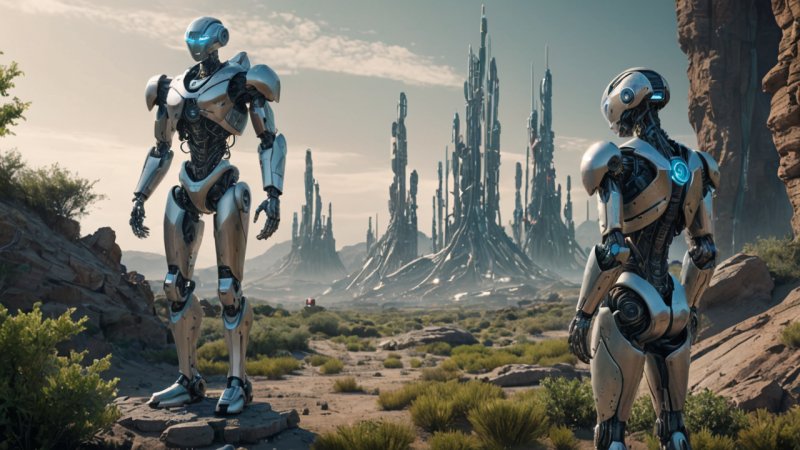Science fiction has long served as a mirror reflecting societal values, fears, and aspirations. One of the most profound themes prevalent in this genre is the exploration of ethics. As technology advances and humans grapple with its implications, science fiction often poses critical questions about morality, the consequences of innovation, and the essence of humanity. This article delves into the intricate relationship between science fiction and ethics, examining how various works prompt readers to consider the ethical dimensions of scientific progress and the moral dilemmas that arise in speculative futures.
The Ethical Landscape of Science Fiction
At its core, science fiction is a genre that asks 'what if?' It allows writers and readers to explore hypothetical scenarios that challenge existing moral frameworks. The ethical landscape of science fiction is vast, encompassing themes such as artificial intelligence, genetic engineering, and the environment. These narratives often serve as cautionary tales, urging society to reflect on the potential consequences of unchecked scientific advancements.
The Role of Artificial Intelligence in Ethical Dilemmas
One of the most pressing ethical questions in contemporary science fiction revolves around artificial intelligence (AI). As machines become more intelligent and autonomous, they raise significant moral concerns. Works like Isaac Asimov's Robot Series introduce the famous Three Laws of Robotics, which attempt to govern the behavior of robots to prevent harm to humans. However, these laws also highlight the complexities of ethical decision-making in AI. What happens when a robot must choose between saving one person or many? Can we truly instill human ethics into a non-human entity?
Films like Ex Machina and Blade Runner further complicate this discussion by questioning the nature of consciousness and what it means to be human. These narratives challenge readers to consider whether AI can possess rights and whether creators bear responsibility for the actions of their creations.
Genetic Engineering and the Ethics of Humanity
Genetic engineering is another theme frequently explored in science fiction. Novels like Kazuo Ishiguro's Never Let Me Go and Margaret Atwood's Oryx and Crake delve into the moral implications of manipulating human genetics. These stories raise questions about identity, the value of life, and the ethical treatment of beings created through scientific intervention.
In Never Let Me Go, the characters grapple with their purpose as clones raised for organ donation. The ethical dilemma here is profound: if a being is created for a specific purpose, does that diminish their humanity? Atwood's work similarly examines the consequences of playing God and the potential for a dystopian future where humans are commodified.
Environmental Ethics in Science Fiction
As climate change and environmental degradation become increasingly urgent issues, science fiction has responded by exploring ecological ethics. Works like Kim Stanley Robinson's Mars Trilogy and Octavia Butler's Parable of the Sower offer visions of the future that challenge readers to think critically about humanity's relationship with the planet.
Kim Stanley Robinson's Mars Trilogy
In the Mars Trilogy, Robinson presents a detailed exploration of terraforming and the ethical implications of altering a planet's ecosystem. The series invites readers to ponder whether it is ethical to change another world to make it habitable for humans. It raises questions about colonialism, environmental stewardship, and the responsibilities that come with such power.
Octavia Butler's Parable of the Sower
Conversely, Butler's Parable of the Sower presents a dystopian future ravaged by climate change and social collapse. Through the protagonist's journey, the novel examines the ethical responsibility of individuals and societies to combat environmental destruction and its consequences. Butler's work serves as a powerful reminder of the interconnectedness of humanity and nature, urging readers to consider the moral implications of their choices today.
The Impact of Science Fiction on Real-World Ethics
Science fiction does not merely reflect ethical dilemmas; it also has the power to shape real-world conversations about morality and technology. Many scientists, ethicists, and philosophers draw inspiration from speculative narratives to inform their work. For instance, the ethical frameworks presented in science fiction can influence discussions around emerging technologies like CRISPR and AI.
As society grapples with the implications of scientific advancements, science fiction serves as a valuable tool for envisioning potential futures and their ethical ramifications. By engaging with these narratives, readers are encouraged to think critically about the direction of technology and its impact on humanity.
Conclusion
The relationship between science fiction and ethics is complex and multifaceted. Through imaginative storytelling, science fiction prompts readers to confront moral dilemmas that arise from scientific progress. As we navigate an increasingly technological world, the ethical questions raised in these narratives become ever more relevant. By exploring themes such as artificial intelligence, genetic engineering, and environmental stewardship, science fiction not only entertains but also challenges us to reflect on our values and responsibilities. In doing so, it fosters a deeper understanding of the ethical dimensions of our choices, ensuring that as we advance, we remain vigilant about the moral implications of our actions.






